Words MAXMILIAN WECHSLER
Her Excellency Mrs Kjersti Rødsmoen has been Ambassador of the Kingdom of Norway to the Kingdom of Thailand since August 2018. Her Nordic vitality and good looks make an immediate impression, and after talking to her you get the feeling that Norway has installed its A team in Bangkok for the next four years.
The short and pointed speech given by Mrs Rødsmoen at the Norwegian Constitution Day was one of the most memorable addresses of its kind in recent years.
We met last month in her office at the Norwegian Embassy on the 18th floor of the UBC II Building on Sukhumvit Road.
Some of the photos seen here were taken at the ambassador’s residence and feature her lovely dog Remba, who devotedly followed Mrs Rødsmoen around the house and garden.
The short and pointed speech given by Mrs Rødsmoen at the Norwegian Constitution Day was one of the most memorable addresses of its kind in recent years.
We met last month in her office at the Norwegian Embassy on the 18th floor of the UBC II Building on Sukhumvit Road.
Some of the photos seen here were taken at the ambassador’s residence and feature her lovely dog Remba, who devotedly followed Mrs Rødsmoen around the house and garden.
Background
“I was born in Singapore in 1963, when it was still part of Malaysia. My father was at the time working there for UNESCO. I lived there for the first three years of my life. I am not a Singaporean citizen; I was offered citizenship when I was quite young but my family didn’t take up the offer. I am pretty sure that the reason today that I am so happy to be in Bangkok are my fond memories of the tropical nights and sounds of insects from my earliest childhood. I feel that I have come home to my roots!
“I joined the Norwegian Ministry of Foreign Affairs (MFA) as a trainee in 1988 – we have a course for new people who enter the MFA. I joined the ministry because I was interested in foreign relations. Also, I was one of many young people who wanted to have a career outside Norway. A life of travel is very tempting when you are a young person.
“I have been assigned twice to the Norwegian Mission to the United Nations headquarters in New York during my diplomatic career. The first time I was in New York for three years, between 1990 and 1993, and the second time I was there for eight years, from 2000 to and 2008. Actually I worked five of those years, and the rest of the time I was studying and taking care of my kids and doing other nice things. The UN is quite a big mission so there are several opportunities for a diplomat there.
“Before coming here I was director and head of the Latin America Section at the MFA in Oslo. I was in charge of all the Norwegian ambassadors in Latin America as well as the main contact for all the Latin American ambassadors in Oslo. I found them to be very joyful and enthusiastic, and it was easy for me to communicate with them because I speak Spanish. They speak either Spanish or Portuguese, and most speakers of Portuguese can understand Spanish well enough. So I could cover the whole continent with one language,” said Mrs Rødsmoen, who besides Norwegian also speaks English, French and German. “I wouldn’t say that I speak all these languages very well, but I can understand them well.
“My term in Thailand is four years. We can work until we are 68, so after I leave here I can go on and be an ambassador somewhere else.”
“I joined the Norwegian Ministry of Foreign Affairs (MFA) as a trainee in 1988 – we have a course for new people who enter the MFA. I joined the ministry because I was interested in foreign relations. Also, I was one of many young people who wanted to have a career outside Norway. A life of travel is very tempting when you are a young person.
“I have been assigned twice to the Norwegian Mission to the United Nations headquarters in New York during my diplomatic career. The first time I was in New York for three years, between 1990 and 1993, and the second time I was there for eight years, from 2000 to and 2008. Actually I worked five of those years, and the rest of the time I was studying and taking care of my kids and doing other nice things. The UN is quite a big mission so there are several opportunities for a diplomat there.
“Before coming here I was director and head of the Latin America Section at the MFA in Oslo. I was in charge of all the Norwegian ambassadors in Latin America as well as the main contact for all the Latin American ambassadors in Oslo. I found them to be very joyful and enthusiastic, and it was easy for me to communicate with them because I speak Spanish. They speak either Spanish or Portuguese, and most speakers of Portuguese can understand Spanish well enough. So I could cover the whole continent with one language,” said Mrs Rødsmoen, who besides Norwegian also speaks English, French and German. “I wouldn’t say that I speak all these languages very well, but I can understand them well.
“My term in Thailand is four years. We can work until we are 68, so after I leave here I can go on and be an ambassador somewhere else.”
Assignment Thailand
“In the Norwegian system there are many steps on the way to becoming an ambassador. This is my first ambassadorial post. I was appointed in early 2018 and left for Bangkok at the end of August. I am also Norway’s ambassador to Cambodia. In fact, I just came from lunch with the Cambodian Ambassador to Thailand. I intend to go there many times per year. I have already had the honor of presenting my credentials to His Majesty the Cambodian King.
“My main and general goal as ambassador to Thailand is to ensure that relations between our two countries continue to be friendly and that we understand each other well. Furthermore I will do my utmost to assist Norwegian companies in any way I can to thrive in Thailand, and in general increase commercial relations between our two countries.
“The consular end is a big part of what the embassy does, visa requests and assisting Norwegian citizens with problems they might have here. So the days of the Embassy are taken up dealing with consular, economic and trade matters, and of course, anything political that might come up. But really, a big part of the job is trying to understand as much as possible the Thai society, so that you are able to give sound advice about what’s going on or who to contact to those people who need knowledge about who to connect with and how Thailand is functioning.”
Concerning trade, the Ambassador said that about half of Norway’s exports to Thailand consist of seafood. “Salmon is a very big export, as are other sea foods like cod and mackerel. Our exports of seafood to Thailand are increasing, and for that reason our Southeast Asian representative for the Norwegian Seafood Council will be relocated from Singapore to Bangkok. Thailand is our most important customer in Southeast Asia.
“As for imports from Thailand to Norway, there’s no one specific item that stands out. There are some vehicles and machines but not a large amount. It differs from year to year. There are some impressive joint commercial and technologically advanced construction ventures that I can mention.
“The biggest of these is an enormous oil platform deck made at Laem Chabang port in Chonburi province for the Norwegian oil firm Aibel. Last year that made up a very big part of Norway’s imports from Thailand. The platform was transported successfully from Thailand all the way to Norway. It was pulled through the Suez Canal. All the parts were constructed here and then it was all assembled in Norway. It was one of the biggest construction projects ever undertaken here in Thailand. It was enormous.”
The ambassador said another part of her job description is to promote Norwegian culture in Thailand, although there’s no funding from her government specifically for that purpose. “We are planning together with other countries a Nordic Film Festival in September. From time to time we work with Norwegian artists and cultural institutions that want to do things here.”
As part of her efforts to get a better understanding of her host country, the ambassador has taken advantage of various opportunities to travel around Thailand and intends to do more in the future. “I was recently in Chiang Rai for a couple of days. It was a very good experience, a lot of interesting things to see. I met with the governor of the province and with representatives from Norwegian businesses. I also visited a school and a village for stateless people.”
“My main and general goal as ambassador to Thailand is to ensure that relations between our two countries continue to be friendly and that we understand each other well. Furthermore I will do my utmost to assist Norwegian companies in any way I can to thrive in Thailand, and in general increase commercial relations between our two countries.
“The consular end is a big part of what the embassy does, visa requests and assisting Norwegian citizens with problems they might have here. So the days of the Embassy are taken up dealing with consular, economic and trade matters, and of course, anything political that might come up. But really, a big part of the job is trying to understand as much as possible the Thai society, so that you are able to give sound advice about what’s going on or who to contact to those people who need knowledge about who to connect with and how Thailand is functioning.”
Concerning trade, the Ambassador said that about half of Norway’s exports to Thailand consist of seafood. “Salmon is a very big export, as are other sea foods like cod and mackerel. Our exports of seafood to Thailand are increasing, and for that reason our Southeast Asian representative for the Norwegian Seafood Council will be relocated from Singapore to Bangkok. Thailand is our most important customer in Southeast Asia.
“As for imports from Thailand to Norway, there’s no one specific item that stands out. There are some vehicles and machines but not a large amount. It differs from year to year. There are some impressive joint commercial and technologically advanced construction ventures that I can mention.
“The biggest of these is an enormous oil platform deck made at Laem Chabang port in Chonburi province for the Norwegian oil firm Aibel. Last year that made up a very big part of Norway’s imports from Thailand. The platform was transported successfully from Thailand all the way to Norway. It was pulled through the Suez Canal. All the parts were constructed here and then it was all assembled in Norway. It was one of the biggest construction projects ever undertaken here in Thailand. It was enormous.”
The ambassador said another part of her job description is to promote Norwegian culture in Thailand, although there’s no funding from her government specifically for that purpose. “We are planning together with other countries a Nordic Film Festival in September. From time to time we work with Norwegian artists and cultural institutions that want to do things here.”
As part of her efforts to get a better understanding of her host country, the ambassador has taken advantage of various opportunities to travel around Thailand and intends to do more in the future. “I was recently in Chiang Rai for a couple of days. It was a very good experience, a lot of interesting things to see. I met with the governor of the province and with representatives from Norwegian businesses. I also visited a school and a village for stateless people.”
Embassy expanding
| “We have 26 people working at our embassy in Bangkok, with Norwegians and Thais split 50-50. We will soon add another 13 people. Bangkok will soon become the regional visa office. We are closing our visa section in other Asian embassies, including in the Philippines, Vietnam, Indonesia and Malaysia. The procedure for the visa applications in these countries will however be the same, so I hope that this will not create too many challenges. “In Thailand, the Embassy has already many years ago outsourced the first step, where the applicants present their documents, to a company called VFS. The company serves as an intermediary between the applicants and the embassy here. They present us with the completed applications and relevant documents. We process the visa request and the applicants are informed of the result through VFS. The process is the same in the other countries. “Thai nationals do need a visa to enter Norway, and more and more Thais are visiting my country every year. Last year we approved almost 13,000 visa requests for Thai nationals. Of course, this is not anywhere near as many Norwegians who come to Thailand, but it is a substantial number. There are approximately 20,000 Thais living and working in Norway. Many of them are married to Norwegians. In fact, in an archipelago towards the North Pole named Svalbard, Thais make up the second largest group, after Norwegians, who live there. |
“It is very dark and very cold throughout much of the year, but it is also very beautiful. Svalbard is the largest continuous wilderness left in Europe and it attracts a surprising number of tourists from all over the world. Almost all the Thai residents there are working in hotels.
“There are about 130,000 Norwegians visiting Thailand every year. That’s a lot considering Norway has a population of around five million. There are approximately 5,000 Norwegians who live permanently in Thailand.
“Norway has two Honorary Consulates in Thailand, one in Phuket and the other in Pattaya. They are doing a very good job in both places and take on a lot of work that otherwise we would have to do.”
“There are about 130,000 Norwegians visiting Thailand every year. That’s a lot considering Norway has a population of around five million. There are approximately 5,000 Norwegians who live permanently in Thailand.
“Norway has two Honorary Consulates in Thailand, one in Phuket and the other in Pattaya. They are doing a very good job in both places and take on a lot of work that otherwise we would have to do.”
Norway facts
Norway is at the top of many global lists. For example, among 180 countries Norway ranks number one on the 2019 Reporters Without Borders World Press Freedom Index, and has commanded this position for three consecutive years. Two other Nordic nations, Finland and Sweden, are ranked second and third respectively.
“Speaking your mind openly and freely as well as press freedom is very important to Norwegians, but at the same time, the press places some restrictions on itself, maybe more than in many other countries. While the Norwegian press certainly holds the powerful and the Norwegian authorities accountable and writes whatever it wants, they don’t write everything they know.
“Norway was ranked third in the 2019 World Happiness Report. Maybe this is remarkable because it is a dark and cold country, but generally Norwegians feel our high ratings are justified and we are proud of them. It is a good country. From what I have experienced here in Thailand, I think Norwegians to a greater extend demand a better work – life balance, to the extent that we might be spoiled. For instance I think Norwegian civil servants have much more flexibility in their work life than have Thai civil servants. We go home in the afternoon and take long vacations. We also pay less attention to detail and are less formal. I have never experienced anything like the Thai hospitality or professionalism when it comes to organizing events and genuinely taking care of guests, but this of course does take a course on those delivering these welcome services.
“Another thing that makes Norwegians safe and happy is our advanced welfare state that provides good services for its people. We have free and public education all the way through university and also more or less free medical care. You have to pay a certain amount for your private doctor, but if you need an operation in the hospital you don’t pay anything. And when you retire, every Norwegian has at least a minimum pension.”
“Speaking your mind openly and freely as well as press freedom is very important to Norwegians, but at the same time, the press places some restrictions on itself, maybe more than in many other countries. While the Norwegian press certainly holds the powerful and the Norwegian authorities accountable and writes whatever it wants, they don’t write everything they know.
“Norway was ranked third in the 2019 World Happiness Report. Maybe this is remarkable because it is a dark and cold country, but generally Norwegians feel our high ratings are justified and we are proud of them. It is a good country. From what I have experienced here in Thailand, I think Norwegians to a greater extend demand a better work – life balance, to the extent that we might be spoiled. For instance I think Norwegian civil servants have much more flexibility in their work life than have Thai civil servants. We go home in the afternoon and take long vacations. We also pay less attention to detail and are less formal. I have never experienced anything like the Thai hospitality or professionalism when it comes to organizing events and genuinely taking care of guests, but this of course does take a course on those delivering these welcome services.
“Another thing that makes Norwegians safe and happy is our advanced welfare state that provides good services for its people. We have free and public education all the way through university and also more or less free medical care. You have to pay a certain amount for your private doctor, but if you need an operation in the hospital you don’t pay anything. And when you retire, every Norwegian has at least a minimum pension.”
The Ambassador said Norway contributes a large amount of funding to international cooperation projects in different countries although no funding is going specifically to Thailand. However, Norway is also one of the top donors in the world to United Nations organizations, which of course have activities in Thailand, so Norway contributes indirectly to aid projects in Thailand. In fact, said the ambassador, the amount of indirect aid can be significant, although it is not done through bilateral agreements like, for instance, aid to African countries.
“I feel very strongly that we can be proud of our gender equality in Norway. These days our prime minister, finance minister as well as the leaders of three of the four government coalition party leaders are women as are half of the government ministers. The president of the Parliament is a woman. For so many years we were told as women what we were not good at and why it would be difficult for us to take up certain roles. Then a few strong women, such as former prime minister Gro Harlem Brundtland pushed through structural changes in society by making child-care more available and work hours more flexible. Now we have the opposite challenge in Norway: Why are young boys not able to keep up with the girls at school or in work life?
“Something that keeps us happy in Norway is that we have a lot of trust in each other – which is not as obvious elsewhere. Among other things, this makes it easy to do business, which is another area in which we are rated highly. When you pay for something in advance, you will normally get it. When you pay taxes, you can believe the tax authorities went into your accounts and checked everything fairly and accurately and the amount they tell you to pay is correct. We are a very open and trusting society. This makes things efficient and easy and we want to make sure it stays that way.
“Norway is not a member of the European Union. Finland and Sweden joined the EU in 1994. We had also a referendum and decided not to join. Still, we have to pay a lot to the EU to be a part of the EU single market. We are a part of the commercial grouping but we are not part of the political project.
“We are quite free outside the EU in all political aspects, but we coordinate with the EU and are very close to its positions in most instances. However, we have more freedom to make up our own minds. We are an original member of NATO. In fact, the present Secretary General of NATO is our former Prime Minister, Jens Stoltenberg.”
“I feel very strongly that we can be proud of our gender equality in Norway. These days our prime minister, finance minister as well as the leaders of three of the four government coalition party leaders are women as are half of the government ministers. The president of the Parliament is a woman. For so many years we were told as women what we were not good at and why it would be difficult for us to take up certain roles. Then a few strong women, such as former prime minister Gro Harlem Brundtland pushed through structural changes in society by making child-care more available and work hours more flexible. Now we have the opposite challenge in Norway: Why are young boys not able to keep up with the girls at school or in work life?
“Something that keeps us happy in Norway is that we have a lot of trust in each other – which is not as obvious elsewhere. Among other things, this makes it easy to do business, which is another area in which we are rated highly. When you pay for something in advance, you will normally get it. When you pay taxes, you can believe the tax authorities went into your accounts and checked everything fairly and accurately and the amount they tell you to pay is correct. We are a very open and trusting society. This makes things efficient and easy and we want to make sure it stays that way.
“Norway is not a member of the European Union. Finland and Sweden joined the EU in 1994. We had also a referendum and decided not to join. Still, we have to pay a lot to the EU to be a part of the EU single market. We are a part of the commercial grouping but we are not part of the political project.
“We are quite free outside the EU in all political aspects, but we coordinate with the EU and are very close to its positions in most instances. However, we have more freedom to make up our own minds. We are an original member of NATO. In fact, the present Secretary General of NATO is our former Prime Minister, Jens Stoltenberg.”
Personal
| “In general I would say that Thailand is a very pleasant place for me to be, in large part because I feel that I am being useful in performing my duties at the embassy and at various functions representing Norway in Thailand. It is also satisfying and rewarding because the relationship has been always friendly between Norway and Thailand. “Norwegians have interests in and are interested in Thailand. So my job is really about making sure that this good relationship continues and, of course, doing anything I can think of to promote and strengthen the relationship. This is of course the standard line from diplomats, but speaking for myself and the embassy, it is very much the case. It is very nice to be ambassador in a place where so many Norwegians are eager to come. “And personally I feel very lucky to be able to work and live with Thai people who truly make me want to be a better person.” When asked how she spends her free time in Thailand, the ambassador said: “I like to read, watch Netflix series, go sightseeing in Bangkok, exercise regularly, and travel and see other places in Thailand and neighboring countries.” |
CV of H.E. Mrs Kjersti Rødsmoen
Personal:
· Born in July 1963.
· Married to Mr Jens Petter Olsen.
· They have two children who study in Trondheim in Norway: Ulrik (20) and Maud (22).
Education:
· 2006-2007: Courses at Columbia University, New York.
(Latin American Economic History and Spanish).
· 1987-1988: PhD courses in business administration and finance at the Norwegian School of Economics and Business Administration (NHH).
· 1982-1986: “Siviløkonom”. Norwegian degree in business administration, NHH.
· 1981-1982: Undergraduate studies in German for Business NHH.
Work experience:
· 2018: Ambassador to Thailand and Cambodia.
· 2012-2018: Director of the Latin America Section of the Ministry of Foreign Affairs (MFA).
· 2008-2012: Deputy Director of the Latin America Section of the MFA.
· 2001-2006: Minister Counsellor at the Permanent Mission of Norway to the UN, New York. (First year as Adviser). Economic, Social & Development issues. Vice president of the board of UNDP.
· 1996-2000: Deputy Director in the Division of Human Resources at the MFA, Oslo.
· 1996: Temporary adviser in International Affairs at the Norwegian Prime Minister’s Office, Oslo.
· 1993-1996: 1st Secretary at the Norwegian Embassy in Mexico City.
· 1990-1993: 2nd Secretary at the Permanent Mission of Norway to the UN, New York.
Fifth Committee (Budget & Administration) and UNICEF.
· 1988-1990: Trainee in the Norwegian Ministry of Foreign Affairs, Oslo.
·1987-1988: Research Associate in Business Administration at the Norwegian School of Economics and Business Administration (NHH).
Personal:
· Born in July 1963.
· Married to Mr Jens Petter Olsen.
· They have two children who study in Trondheim in Norway: Ulrik (20) and Maud (22).
Education:
· 2006-2007: Courses at Columbia University, New York.
(Latin American Economic History and Spanish).
· 1987-1988: PhD courses in business administration and finance at the Norwegian School of Economics and Business Administration (NHH).
· 1982-1986: “Siviløkonom”. Norwegian degree in business administration, NHH.
· 1981-1982: Undergraduate studies in German for Business NHH.
Work experience:
· 2018: Ambassador to Thailand and Cambodia.
· 2012-2018: Director of the Latin America Section of the Ministry of Foreign Affairs (MFA).
· 2008-2012: Deputy Director of the Latin America Section of the MFA.
· 2001-2006: Minister Counsellor at the Permanent Mission of Norway to the UN, New York. (First year as Adviser). Economic, Social & Development issues. Vice president of the board of UNDP.
· 1996-2000: Deputy Director in the Division of Human Resources at the MFA, Oslo.
· 1996: Temporary adviser in International Affairs at the Norwegian Prime Minister’s Office, Oslo.
· 1993-1996: 1st Secretary at the Norwegian Embassy in Mexico City.
· 1990-1993: 2nd Secretary at the Permanent Mission of Norway to the UN, New York.
Fifth Committee (Budget & Administration) and UNICEF.
· 1988-1990: Trainee in the Norwegian Ministry of Foreign Affairs, Oslo.
·1987-1988: Research Associate in Business Administration at the Norwegian School of Economics and Business Administration (NHH).

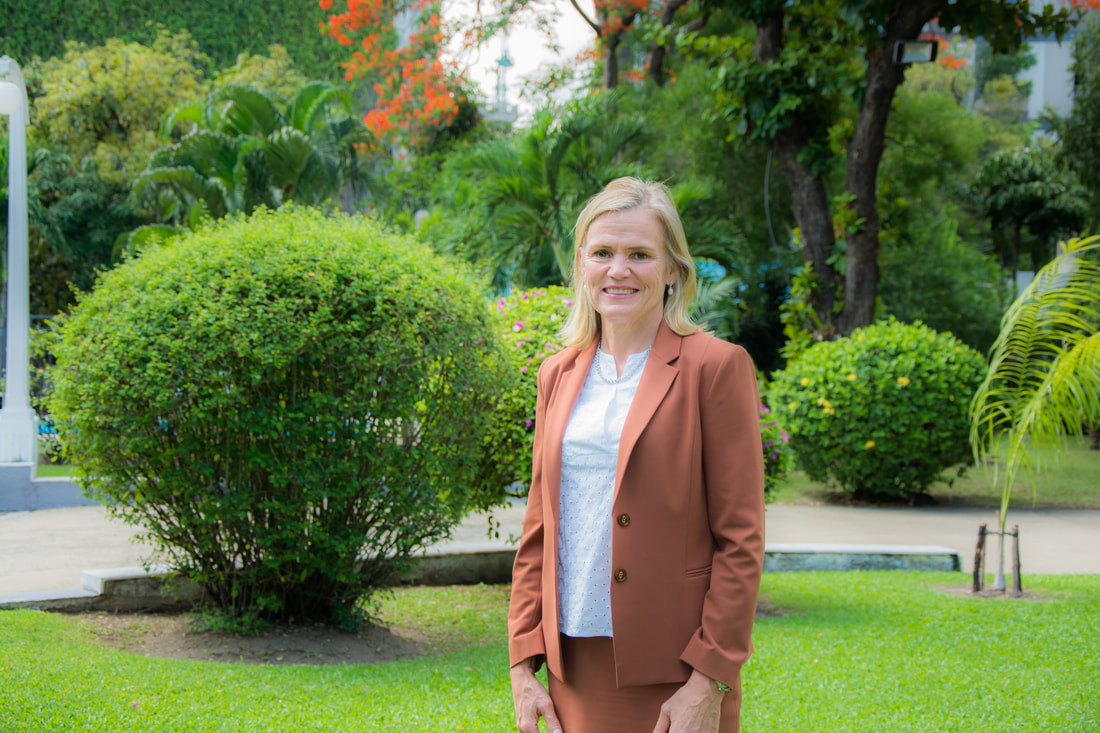
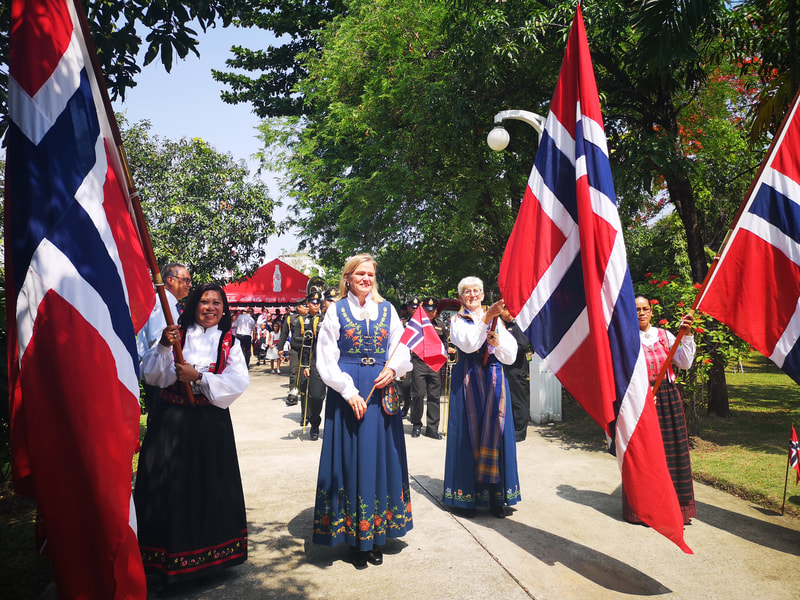
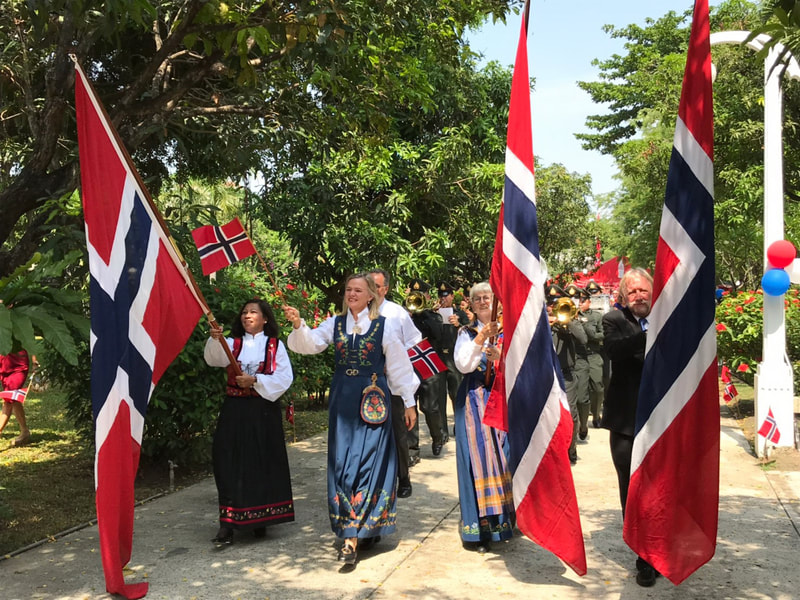
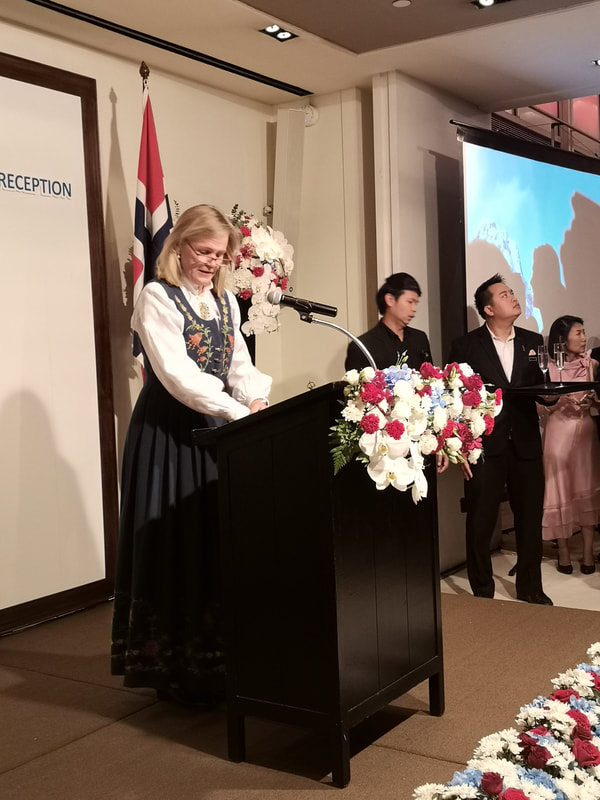
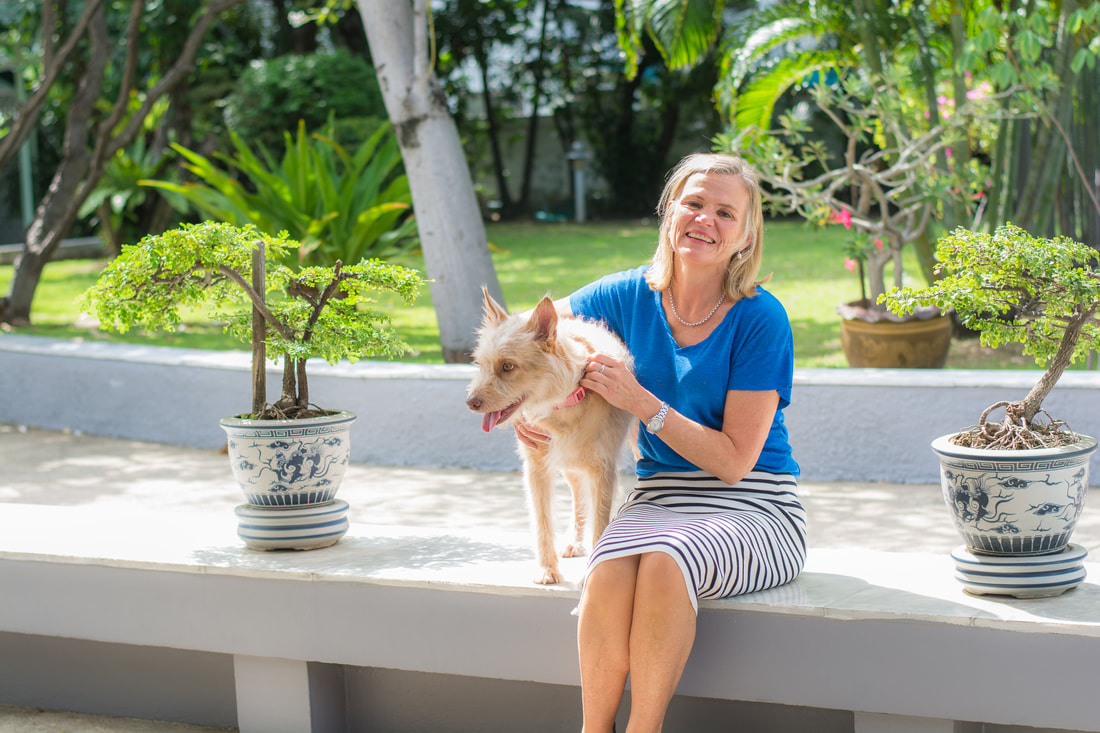
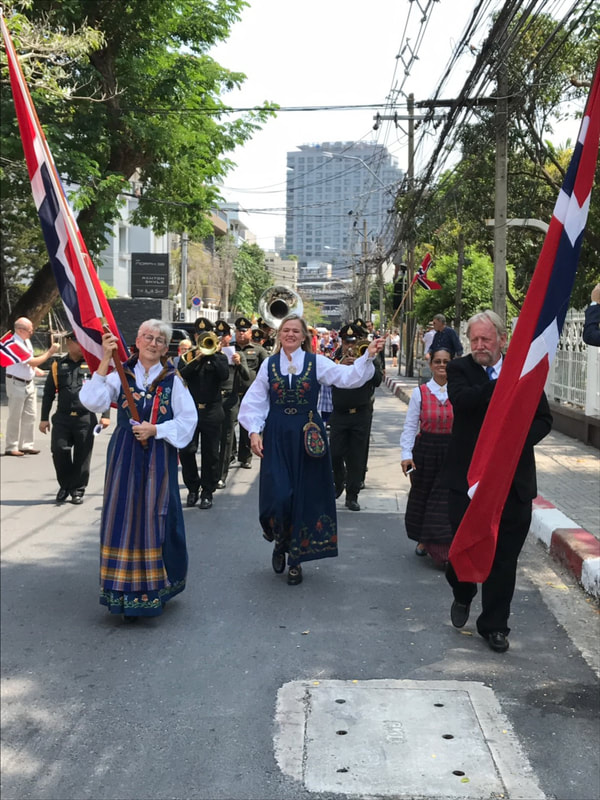
 RSS Feed
RSS Feed
















